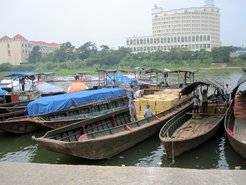Differences in perceptions of business ethics between Chinese and Vietnamese trading partners (Móng Cái city, Vietnam)

Vietnam and China have reopened their border in 1991 with the normalization of their diplomatic relations. Since then, they endeavour to overcome historical conflicts and remaining resentments. One sign of this new era is the establishment in their borderlands of economic development zones largely dedicated to cooperative trade. Still, various issues slow down the initial impulse of economic exchanges that marked the 1990s. The aim of this research is to explore under which conditions this vast program is empirically implemented by its actors - the local border-traders -especially under the unevenness of state policies regarding the regulation of transactions' flows. Indeed, business transactions occur on the ground of discrepancies at the level of economic policy-makers who recurrently impose various restrictions in response to recurring diplomatic issues between Vietnam and China
Regardless of such contextual/conjectural hindrances, business transactions at the border still go on thanks to motivated local entrepreneurs and the flows of migrants from both countries rushing into a land of opportunities. Móng Cái city is experiencing such an impressive and dynamic development, and it is now partly devoted to wholesale of Chinese goods: it is a key-spot for many Vietnamese buyers and Chinese traders to conduct their business, within one of the vast market spaces built in the city centre. It is also a specific social space where Chinese suppliers meet, live and exchange with their Vietnamese clients.
But despite intensive social interactions and business transactions, persisting misunderstandings on trading methods still have a profound impact on the everyday exchanges between Vietnamese and Chinese people. This is particularly obvious in the context of commercial relations. Narratives of business experience that emphasize mutual distrust, questions of debt, default of agreement, tend to stress cross-border trade relations and put strain on efficient economic collaboration.
Using the approach of social representations to articulate feelings toward “Otherness,” I will explore what factors frame the current trading relationships between Chinese suppliers and their Vietnamese clients. I will examine how the history of border localities, the uneven border-trade regulations and the social background of local and non-local traders impact and eventually shape business partners’ mutual perceptions. The understanding of this background will allow me to investigate differences in business ethics and trading practices among commercial partners of both sides of the border and their creativity in coping with the Vietnamese and Chinese states' control and disrupting intervention. Drawing on the results of these findings, I will then discuss how all these structural conditions still affect the sustainability of trading operations between the Sino-Vietnamese border communities.
